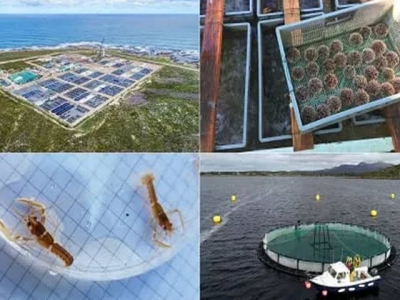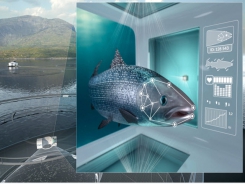An €8 million incentive for integrated multi-trophic aquaculture

A new €8 million EU initiative which focuses on increasing the value and sustainability for integrated multi-trophic aquaculture (IMTA) production in the Atlantic regions has been launched this week.
The ASTRAL project aims to promote IMTA © Marine Institute, Ireland; Department of Environment, Forestry and Fisheries (DEFF) , South-Africa; SkyPixels, Riaan Huysamen.
Called ASTRAL (All Atlantic Ocean Sustainable, Profitable and Resilient Aquaculture), it is a HORIZON 2020 project, recently financed under the Blue Growth programme. It is being led by the Norwegian research centre, NORCE.
According to a news release by NORCE, the project aims to contribute to the implementation of the Belém Statement – an agreement signed by the EU, Brazil and South Africa to develop a strategic partnership on marine research – and it will participate in building the All Atlantic Ocean Community.
It is being undertaken by a consortium that includes partners from Norway, Scotland, Ireland, France, Spain, Portugal, Nigeria, South Africa, Argentina and Brazil.
According to NORCE, the main goal of the project is to develop new, resilient, and profitable value chains for IMTA production – systems in which multiple aquatic species from different trophic levels are farmed together. Waste from one species is used as inputs (fertilisers and food) for another species.
Other goals include increasing the circularity of the systems and achieving zero-waste aquaculture systems, as well as the creation of appropriated business models to increasing profitability.
Biosensors, IoT and AI data analytics
Potential climate risks and emerging pollutants (microplastics, harmful algae blooms, pathogens) will be assessed, together with the development of innovative technology (specific sensors and biosensors, IoT and AI data analytics), with the final aim to provide monitoring recommendations to policymakers.
Sharing knowledge and capacity development are among ASTRAL’s priorities, to build a collaborative ecosystem along the Atlantic Ocean with industrial partners, SMEs, scientists, policymakers, social representatives and other relevant stakeholders.
A multidisciplinary team
The ASTRAL consortium consists of a team of experts from different disciplines – including marine biology, environmental management, economics, business administration and computer engineering – as well as SMEs and other relevant stakeholders from several countries along the Atlantic Ocean.
It includes representatives from research and technology organisations (NORCE, LEITAT, SAMS CSIR, CONICET, Marine Institute, NIOMR), universities (Federal University of Rio Grande, University of Cape Town), SMEs (BioceanOR, EGM, Crowdhelix, M&O Partners, Viking Aquaculture), an industrial cluster (PoleMer Bretagne Atlantique) and an intergovernmental organisation (AIR Centre).
“In ASTRAL, we have the best possible basis to fulfill the project’s main goal, both for the northern and southern regions: to make the aquaculture practices more sustainable, increasing the circularity, the resilience and the profitability,” said Elisa Ravagnan, project coordinator at NORCE.
“We are very excited to start this project. We are looking forward to collaborate with stakeholders from both sides of the Atlantic, as well as with all the projects financed under the same programme, to build together the best solutions for sustainable aquaculture in the Atlantic Ocean,” Ravagnan added.
Có thể bạn quan tâm
Phần mềm

Phối trộn thức ăn chăn nuôi

Pha dung dịch thủy canh

Định mức cho tôm ăn

Phối trộn phân bón NPK

Xác định tỷ lệ tôm sống

Chuyển đổi đơn vị phân bón

Xác định công suất sục khí

Chuyển đổi đơn vị tôm

Tính diện tích nhà kính

Tính thể tích ao hồ



 What are the most cost-effective sea lice treatments?
What are the most cost-effective sea lice treatments?  The case against eyestalk ablation in shrimp aquaculture
The case against eyestalk ablation in shrimp aquaculture